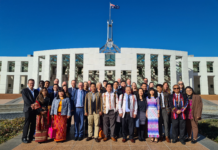
Every day, thousands of Christians from NSW and ACT churches step out of their comfort zones, going where many others fear to tread, in order to share their faith with people from a different culture. Thousands more are being called.
They may not move geographically and may still use the language they use at home, but they think carefully about how they will be understood by those they’re ministering among. They adopt different ways of communication to have greater impact to those outside the church.
These cross-cultural workers are those who embrace mission in the community that they live in. The culture may be ethnically the same, but it is nevertheless different from the culture of the church.
Some of these cross-cultural workers are Scripture teachers who recognise that schools are different from when they went to school, and that children are no longer trained to sit and listen. These Scripture teachers make the effort to adapt to contemporary interactive learning ways. There’s a culture gap, but they’re overcoming it. Others lead kids’ clubs in our churches. They work hard to gain rapport with families who are not used to church.
Culture gaps can be overcome, but it takes intention. There’s a sense in which we all need to be cross-cultural workers. The first step is AWARENESS.
A friend told me that a new member of her home group, a lady in her 70s who is brand new to church, said ‘I really like the church. The office lady and the pastor are very nice but I’m not sure about Jesus. He and the apostles came from another country and didn’t look like we do’.
Regular churchgoers certainly don’t think of Jesus and the apostles that way. This lady shared the same language and ethnic background as my friend but there was definitely a culture gap between her and the church. Those who are serious about communicating effectively start with the culture of the people they’re sent to. Like cross-cultural missionaries, they listen and learn to understand and connect appropriately.
Some Christians are so entrenched in their church language and customs that they consider anyone different is either ignorant or wicked, or just plain wrong. They never imagine what they would be like if they’d been born in another time or place or into another family.
After AWARENESS must come ADJUSTMENT. In most areas, the culture outside the church is not the culture of the church, even if the population is ethnically identical (which it rarely is). Those venturing into the non-Christian culture, for Jesus’ sake, need to be the ones to change their language and way of relating. If they don’t, they’re likely to be misunderstood or avoided.
For example, kids’ group leaders might talk at church about children ‘choosing to follow Jesus’ (or ‘making a decision’ or however we express it in our particular culture). For a parent unfamiliar with these concepts there is a huge gap in understanding, even if they understand the words. They are more likely to understand something like ‘showing a growing interest in spiritual things’ or ‘wanting to discover more about living the way Jesus did’. For us, such words may not describe it well, but, when we’re engaged in cross-cultural activity, we put aside the church way of speaking and acting, for the sake of those we’re ministering among.
The best way to learn another culture is to live in it, to eat, drink, chat, play, laugh and cry in it. It takes moving outside our comfort zones onto others’ home turf, even if it is just next door. Only then will we be aware enough of our own culture, and the culture of those we are called to reach, that we can make the adjustments necessary to share the message of Jesus in a way that sounds like good news.



































